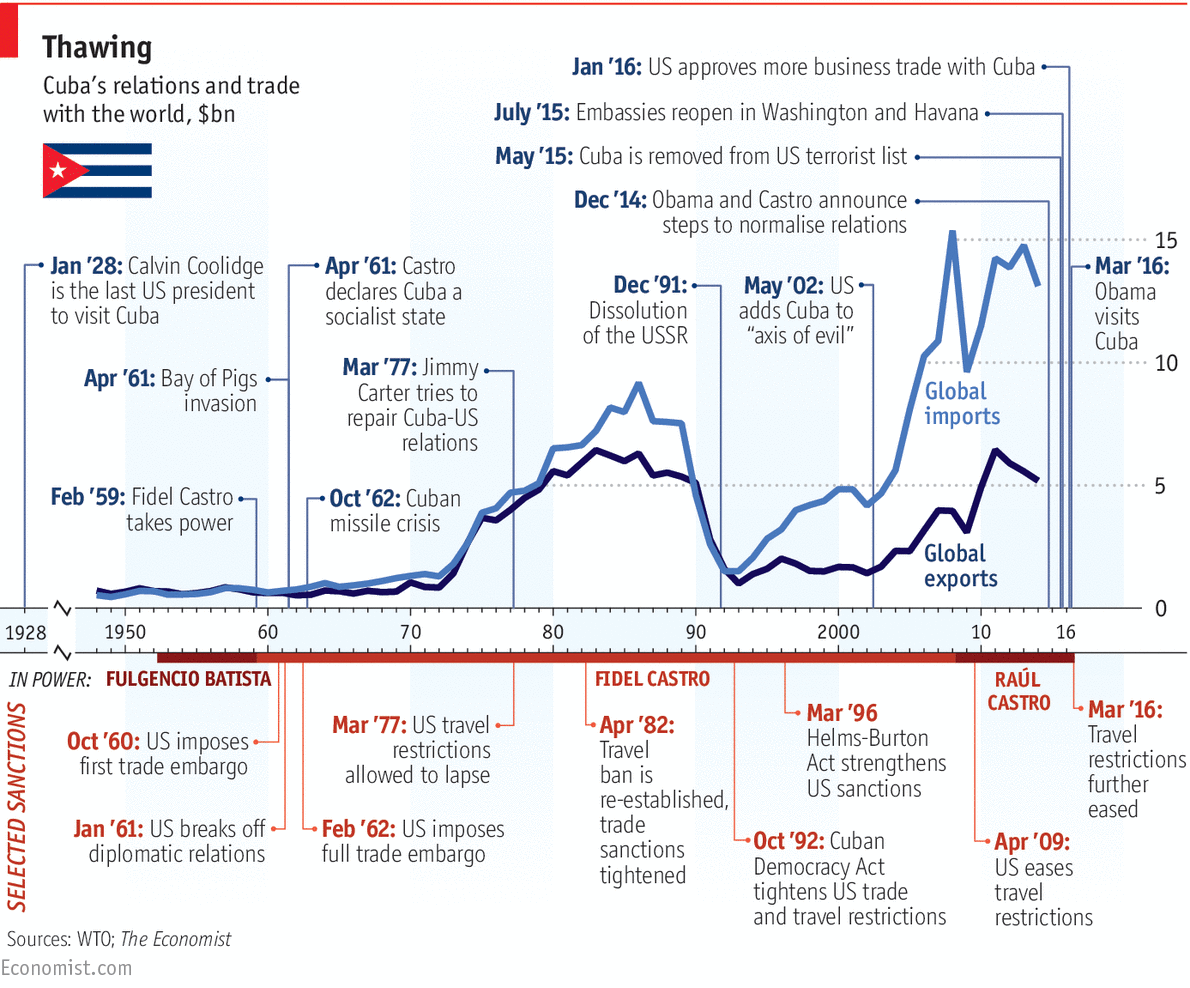The Economist, April 29, 2016
Original Article: Fidel’s Last Stand
WHEN Fidel Castro made a brief appearance at the Cuban Communist Party’s seventh congress on April 19th he was greeted with prolonged applause. “Well, let’s move to another subject,” he eventually said, his stentorian voice distorted by age. It was a joke. But he might as well have been turning the page on the historic visit to Havana by Barack Obama in March and the expectations it generated among Cubans of speedy changes. Having reminded his audience that he would soon turn 90 and that death comes to all, Fidel went on: “The ideas of Cuban communists will endure.”
No serious student of Cuba imagined that Mr Obama’s visit and his televised call for free elections would prompt overnight change. But the party congress proved to be a disappointment even by the cautious standards of the reforms that Raúl Castro, Fidel’s slightly younger brother, has set in train since he took over as president in 2008.
The stasis was symbolised by the retention as second party secretary (behind only Raúl) of José Ramón Machado Ventura, an 85-year-old Stalinist ideological enforcer. Even officials had hinted that his powerful post might be passed to Miguel Díaz-Canel (56), the vice-president and Raúl’s putative successor as president in 2018. Five new, youngish members joined the politburo, but none is known to be a reformer. Earlier hopes in Havana that the congress might approve an electoral reform and a bigger role for the rubber-stamp parliament were dashed.
Raúl Castro devoted part of his opening report to the congress to answering Mr Obama. Complaining of a “perverse strategy of political-ideological subversion”—a reference to Mr Obama’s call for the empowerment of Cuba’s small businesses and incipient civil society—Raúl told the delegates that “we must reinforce anti-capitalist and anti-imperialist culture among ourselves.” As for free elections, he twice insisted: “If they manage some day to fragment us, it would be the beginning of the end…of the revolution, socialism and national independence.”
He insisted that the “updating” of Cuba’s economy, to give a bigger role to the non-state sector and remove distortions and subsidies, would continue “without haste but without pause”. In fact, the reforms have all but halted: of the 313 “guidelines” approved at the previous congress in 2011, only 21% have been fully implemented. The government recently reintroduced price caps on some foodstuffs.
Days before the congress Omar Everleny Pérez, the most prominent of the reformist economists advising Raúl, was sacked from his post at the University of Havana. His alleged fault had been to share information with American academics. Mr Pérez has often called for the reforms to go faster.
One hypothesis is that Raúl can afford to move more slowly because of the injection of dollars from Mr Obama’s loosening of restrictions on tourism, remittances and investment. That may be true in the short term. But Raúl himself offered a withering critique of Cuba’s underlying problems, criticising “out-of-date mentalities”, “a complete lack of a sense of urgency” in implementing change and the “damaging effects of egalitarianism” in failing to reward work or initiative. He lamented the economy’s inability to raise wages, which “are still unable to satisfy the basic needs of Cuban families”.
So what explains Raúl’s caution? He said that he had joked with American officials that “If we were to have two parties in Cuba, Fidel would head one and I the other.” Joking apart, that rings true. Many of the Communist Party’s 670,000 members are terrified of change, fearing the loss of security, perks and privileges. They see Mr Obama’s opening to Cuba as an existential threat. Fidel is their reference point. He acts as a brake on reform.
What Raúl, in his neat and tidy way, is doing is to institutionalise the Cuban system, which long depended on Fidel’s whims. He has set out a gradual process of transition to a post-Castro leadership. He is no liberal democrat: he praises the balance between state planning and the market in China and Vietnam. He has initiated both a “conceptualisation” of Cuba’s socioeconomic model and a revision of the constitution to incorporate his reforms. These will be the Castro brothers’ political testament.
But Raúl, unlike Fidel, is a realist. He knows that the system does not work and that the steps he has taken, especially the opening to the United States, have unleashed expectations of change and a better standard of living. Cuban society is evolving fast, even as the political leadership remains as stodgy as a government-supplied lunch. In the medium term, something will have to give.


